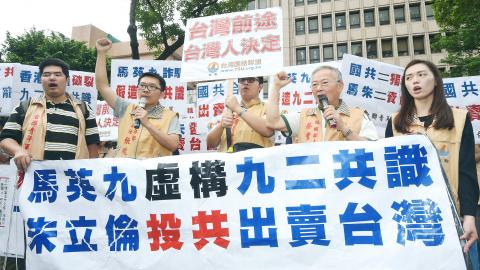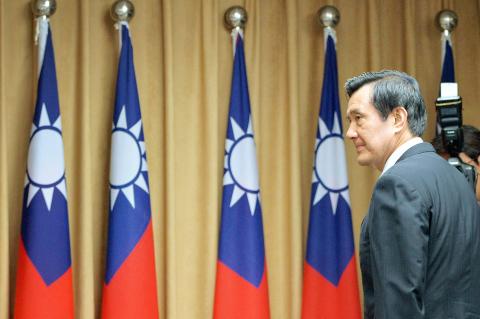Echoing Chinese President Xi Jinping’s (習近平) description of consequences that Xi said would follow any change to the political formula that endorses the “one China” principle — the so-called “1992 consensus,” President Ma Ying-jeou (馬英九) yesterday said that the “political basis” for cross-strait interaction is “irreplaceable.”
Cross-strait relations prosper when they go along with the “1992 consensus,” wither when they part from it and decline into chaos when they go against it — as evidenced by the development of the cross-strait relationship over the past 23 years, Ma said in a speech at the Mainland Affairs Council.
Ma’s conclusions echoed Xi’s recent statement that challenging the “1992 consensus” would “trigger an earthquake and topple hills.”

Photo: Wang Min-wei, Taipei Times
Ma read a 4,650-word statement about the “1992 consensus,” titled “Peace and Prosperity: The Common Future of Cross-Strait Relations.”
Officials said the statement covered the origins and history of the phrase, and to tally the effects it has had on cross-strait ties.
The “1992 consensus,” a term former Chinese Nationalist Party (KMT) lawmaker Su Chi (蘇起) admitted making up in 2000 when he was head of the council, refers to a tacit understanding between the KMT and the Chinese government that both sides of the Taiwan Strait acknowledge that there is “one China,” with each side having its own interpretation of what “China” means.

Photo: CNA
Ma listed in the speech the “challenges” facing the adoption and implementation of the consensus and the various initiatives advocated, separately, by former Democratic Progressive Party (DPP) chairman Frank Hsieh (謝長廷), DPP Chairperson Tsai Ing-wen (蔡英文) and Taipei Mayor Ko Wen-je (柯文哲) as potential alternative frameworks for engaging with Beijing.
None of the proposals is a substitute for the “1992 consensus,” since “they were neither endorsed by Taiwanese society nor by [China],” Ma said.
However, the president said he “viewed positively” recent statements by Tsai and Ko.
Tsai has said that the DPP would maintain the “status quo” in cross-strait ties, examine cross-strait agreements under a supervision framework and continue negotiations if it returns to power.
Ko has proposed a “2015 point of view,” which respects cross-strait history and all of the agreements signed and agreed upon, as well as the “four mutuals”: mutual awareness, mutual understanding, mutual respect and mutual cooperation.
Nevertheless, “the proposals by Chairperson Tsai and Mayor Ko shun the issue of ‘one China,’” Ma said.
He said that his administration has made it “crystal clear” that the “one China” in the “1992 consensus” means the Republic of China (ROC).
Ma then posed two questions to Tsai, saying that Tsai, as her party’s nominee for next year’s presidential election, is duty-bound to provide unequivocal answers.
“First, what is the ‘status quo?’ Is it the policy of ‘no independence, no unification and no use of force,’ in line with the ROC Constitution and the peaceful development in cross-strait relations made possible by the ‘1992 consensus’ on ‘one China,’ with each side having its own interpretation?” Ma said.
“Second, how should the ‘status quo’ be maintained,” he said.
The “1992 consensus” is not a cure-all, but is the formula that can resolve problems hindering cross-strait relations — mainly disagreement over “one China” — maintain the “status quo” and bring peace and prosperity to the relationship, Ma said.
The consensus has provided the political basis that both sides willingly accepted, Ma said.
In interpreting what “one China” is in the formula, “we have to abide by the ROC Constitution,” Ma said. “Of course, the ‘one China’ for us is the ROC, not ‘two Chinas,’ ‘one China, one Taiwan’ or ‘Taiwanese independence.’”
Critics have said the KMT’s version of the “1992 consensus” is wishful thinking, as Beijing has never accepted the existence of the ROC and has been intolerant of symbols of the ROC’s sovereignty.
Chinese officials, including Xi, have said “the mainland and Taiwan belong to the same ‘one China,’” calling it a “core element” of the “1992 consensus” without mentioning “respective interpretations.”
Ma said the question of what the “one China” is “should be set aside.”
“Surely this is an issue that needs to be addressed, but in the future, not now. We must spend time and energy advancing exchanges, rather than interpreting what ‘one China’ is. Otherwise, we would be derailed in efforts to deal with other issues,” Ma said.
His visit to the council came ahead of New Taipei Mayor and KMT Chairman Eric Chu’s (朱立倫) planned trip to China and a meeting with Xi.
It was the second time Ma made such a visit to the council; the first was in July 2008, two months after he took to office.
Ma said yesterday’s visit was timed to commemorate the first high-level cross-strait meeting, which took place 22 years ago yesterday in Singapore, as well as a meeting between then-KMT chairman Lien Chan (連戰) and then-Chinese president Hu Jintao (胡錦濤) in Beijing 10 years ago.
“Chu has told me that he wished to consolidate and deepen the ‘1992 consensus’ [in his meeting with Xi] and incorporate the formula in Taiwan’s participation in regional economic integration,” Ma said.
“Our views on those issues are exactly identical,” he said.

A magnitude 7.0 earthquake struck off Yilan at 11:05pm yesterday, the Central Weather Administration (CWA) said. The epicenter was located at sea, about 32.3km east of Yilan County Hall, at a depth of 72.8km, CWA data showed There were no immediate reports of damage. The intensity of the quake, which gauges the actual effect of a seismic event, measured 4 in Yilan County area on Taiwan’s seven-tier intensity scale, the data showed. It measured 4 in other parts of eastern, northern and central Taiwan as well as Tainan, and 3 in Kaohsiung and Pingtung County, and 2 in Lienchiang and Penghu counties and 1

A car bomb killed a senior Russian general in southern Moscow yesterday morning, the latest high-profile army figure to be blown up in a blast that came just hours after Russian and Ukrainian delegates held separate talks in Miami on a plan to end the war. Kyiv has not commented on the incident, but Russian investigators said they were probing whether the blast was “linked” to “Ukrainian special forces.” The attack was similar to other assassinations of generals and pro-war figures that have either been claimed, or are widely believed to have been orchestrated, by Ukraine. Russian Lieutenant General Fanil Sarvarov, 56, head

FOREIGN INTERFERENCE: Beijing would likely intensify public opinion warfare in next year’s local elections to prevent Lai from getting re-elected, the ‘Yomiuri Shimbun’ said Internal documents from a Chinese artificial intelligence (AI) company indicated that China has been using the technology to intervene in foreign elections, including propaganda targeting Taiwan’s local elections next year and presidential elections in 2028, a Japanese newspaper reported yesterday. The Institute of National Security of Vanderbilt University obtained nearly 400 pages of documents from GoLaxy, a company with ties to the Chinese government, and found evidence that it had apparently deployed sophisticated, AI-driven propaganda campaigns in Hong Kong and Taiwan to shape public opinion, the Yomiuri Shimbun reported. GoLaxy provides insights, situation analysis and public opinion-shaping technology by conducting network surveillance

‘POLITICAL GAME’: DPP lawmakers said the motion would not meet the legislative threshold needed, and accused the KMT and the TPP of trivializing the Constitution The Legislative Yuan yesterday approved a motion to initiate impeachment proceedings against President William Lai (賴清德), saying he had undermined Taiwan’s constitutional order and democracy. The motion was approved 61-50 by lawmakers from the main opposition Chinese Nationalist Party (KMT) and the smaller Taiwan People’s Party (TPP), who together hold a legislative majority. Under the motion, a roll call vote for impeachment would be held on May 19 next year, after various hearings are held and Lai is given the chance to defend himself. The move came after Lai on Monday last week did not promulgate an amendment passed by the legislature that